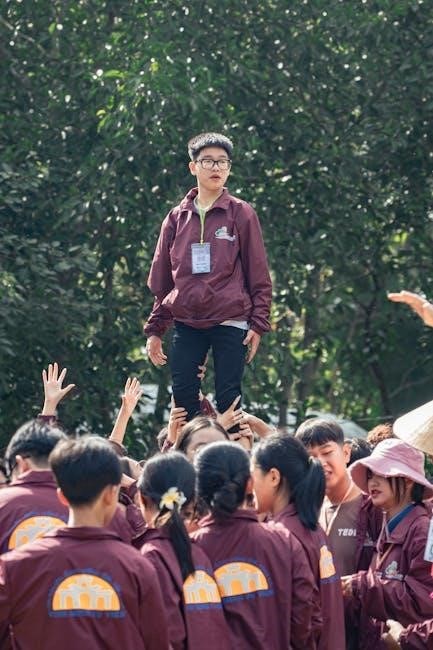Leadership workshop activities are designed to enhance skills through interactive exercises and discussions․ These workshop activities foster collaboration, emotional intelligence, and decision-making, helping participants grow into effective leaders․ Resources like PDF guides provide practical exercises for real-world application․
Overview of Leadership Development
Leadership development focuses on building the skills, knowledge, and behaviors necessary for effective leadership․ It involves a blend of theoretical learning and practical application through activities like workshops, coaching, and team-building exercises․ These programs aim to foster emotional intelligence, decision-making, and communication skills, enabling individuals to inspire and guide others․ By addressing real-world challenges, leadership development helps participants develop a growth mindset and become adaptable, resilient leaders․ Workshops often include interactive exercises, case studies, and reflection tools to enhance personal and professional growth, ensuring leaders can navigate complex organizational environments successfully․
Importance of Interactive Workshops
Interactive workshops are crucial for fostering engagement and practical learning in leadership development․ They provide a dynamic environment where participants can apply theories to real-world scenarios through activities, group exercises, and discussions․ These workshops encourage collaboration, creativity, and problem-solving, helping leaders develop essential skills like communication and emotional intelligence․ By actively involving participants, workshops bridge the gap between theory and practice, ensuring a more impactful and lasting learning experience․ They also promote a sense of community and shared growth among leaders, enhancing overall organizational effectiveness and adaptability in a rapidly changing world․
Key Concepts in Leadership Workshops
Leadership workshops focus on key concepts like decision-making, communication, and emotional intelligence․ These activities help leaders develop practical skills, fostering collaboration and problem-solving in real-world scenarios effectively․
Defining Leadership and Its Role in Modern Organizations
Leadership is the ability to inspire, motivate, and guide individuals toward achieving common goals․ In modern organizations, leaders play a crucial role in fostering innovation, collaboration, and adaptability․ Effective leadership involves setting a clear vision, making informed decisions, and empowering teams to succeed․ Through workshops and activities outlined in PDF resources, participants gain insights into these principles, enabling them to drive organizational success and create a positive work culture․
Leadership vs․ Management: Understanding the Difference
Leadership focuses on inspiring and motivating individuals to achieve a shared vision, while management emphasizes planning, organizing, and controlling resources․ Leaders drive change and innovation, whereas managers ensure efficiency and stability․ Workshops often highlight this distinction through activities like role-playing exercises and case studies, as outlined in PDF guides․ Understanding this difference helps individuals adopt the right approach for their roles, fostering both personal and organizational growth․
Characteristics of Effective Leaders
Effective leaders possess strong emotional intelligence, communication skills, and the ability to inspire others․ They are visionaries who empower teams, foster collaboration, and make informed decisions․ Key traits include adaptability, resilience, and a commitment to continuous learning․ Leaders also demonstrate authenticity, empathy, and a focus on achieving shared goals․ Workshops often emphasize these qualities through interactive exercises, helping participants develop the mindset and behaviors needed to lead successfully in dynamic environments․

Core Competencies for Leadership Development
Core competencies include communication, emotional intelligence, decision-making, and problem-solving․ These skills, developed through workshops, enable leaders to inspire, guide, and drive organizational success effectively․
Communication Skills in Leadership
Effective communication is a cornerstone of leadership, enabling clear expression of ideas, active listening, and fostering collaboration․ Workshops often include activities like role-playing, group discussions, and presentations to refine these skills․ Leaders learn to articulate visions clearly and engage teams meaningfully, ensuring alignment and motivation․ These exercises, often detailed in PDF resources, help leaders adapt their communication style to diverse audiences, enhancing understanding and trust within organizations․ Strong communication skills are vital for resolving conflicts and driving collective success․
Emotional Intelligence and Self-Awareness
Emotional intelligence (EI) is crucial for leaders to understand and manage their emotions and those of others․ Workshops often include self-assessment exercises, role-playing, and reflective discussions to enhance EI․ Activities focus on empathy, stress management, and interpersonal skills, helping leaders build stronger relationships and make informed decisions․ These exercises, detailed in PDF resources, empower leaders to navigate emotional challenges and foster a positive organizational culture․ Developing self-awareness and EI enables leaders to inspire trust, collaboration, and resilience within their teams․
Decision-Making and Problem-Solving Strategies
Effective decision-making and problem-solving are core leadership skills, often developed through interactive workshop activities; These exercises encourage leaders to analyze situations, weigh options, and implement solutions․ Techniques like SWOT analysis, mind mapping, and scenario planning are commonly used to enhance critical thinking․ Group activities, such as case studies and brainstorming sessions, foster collaboration and innovation․ PDF resources provide structured exercises to practice these strategies, helping leaders make informed decisions and navigate complex challenges confidently․ These skills are essential for driving organizational success and adaptability in dynamic environments․

Team-Building Activities for Leadership Workshops
Team-building activities, such as icebreaker games and trust exercises, foster unity and collaboration․ These exercises, including collaborative tasks like bridge building, enhance communication and problem-solving skills, essential for effective leadership․
Icebreaker Games to Foster Collaboration
Icebreaker games are essential for initiating engagement in leadership workshops․ Activities like “Human Bingo” or “The Name Game” encourage participants to interact, reducing initial tension․ These exercises promote a relaxed environment, fostering open communication and teamwork․ By sharing experiences or completing fun challenges, individuals build connections, laying the groundwork for collaborative efforts․ Such games not only enhance group dynamics but also set the tone for productive discussions and mutual respect, crucial for effective leadership development․ They are simple yet impactful tools for kickstarting meaningful interactions and teamwork․
Trust-Building Exercises for Teams
Trust-building exercises are vital for fostering strong, cohesive teams in leadership workshops․ Activities like “Trust Walks” or “Blindfold Challenges” encourage reliance on teammates, promoting mutual confidence․ These exercises often involve problem-solving or physical tasks that require open communication and dependency․ By creating scenarios where participants must trust one another, these activities strengthen relationships and enhance collaboration․ Trust is the foundation of effective teamwork, and such exercises help leaders cultivate it, ensuring their teams can thrive in challenging situations and achieve shared goals․ These exercises are practical and impactful for leadership development․
Collaborative Problem-Solving Activities
Collaborative problem-solving activities foster teamwork and creative thinking among participants․ These exercises, often included in leadership workshop PDF guides, involve challenges like bridge-building or escape room scenarios․ Teams must work together to brainstorm, plan, and execute solutions, fostering innovation and shared responsibility․ Such activities help leaders develop the ability to guide groups toward common goals while encouraging open communication and adaptability․ They are designed to enhance critical thinking and decision-making skills, preparing leaders to tackle real-world challenges effectively and collaboratively․
Conflict Resolution and Negotiation Techniques
Conflict resolution and negotiation techniques are essential for effective leadership․ Workshops often include activities like role-playing and scenario-based exercises to enhance these skills, fostering clear communication and mutual agreement․
Workshop Activities for Conflict Resolution
Workshop activities for conflict resolution often include role-playing exercises, scenario-based discussions, and group problem-solving challenges․ These activities help participants practice active listening, empathy, and negotiation strategies․ Leadership workshop activities PDF resources frequently feature exercises like “Resolve the Dispute” or “Negotiation Role-Play,” where teams tackle real-world conflicts․ Such exercises foster collaboration and equip leaders with tools to manage disagreements constructively, promoting a positive and productive work environment․ These practical exercises ensure participants can apply their skills in real-life situations effectively․
Negotiation Skills Development
Negotiation skills development is a critical component of leadership training․ Workshop activities often include role-playing exercises and scenario-based negotiations to refine these skills․ Participants engage in activities like “Negotiation Role-Play” or “Win-Win Bargaining” to practice active listening, persuasion, and compromise․ Leadership workshop activities PDF resources provide structured exercises to help leaders master negotiation strategies, fostering collaboration and mutual understanding․ These practical exercises empower leaders to navigate complex discussions confidently and achieve beneficial outcomes for all parties involved․
Mentorship and Coaching in Leadership Development
Mentorship programs foster personal and professional growth by pairing participants with experienced leaders․ Coaching sessions provide tailored guidance, enhancing self-awareness and decision-making skills through structured exercises and feedback․
Creating Mentorship Programs
Creating mentorship programs involves pairing participants with experienced leaders for guidance and support․ These programs are tailored to enhance leadership skills, foster professional growth, and build confidence․ Structured activities and feedback sessions are essential components․ Resources like PDF guides offer detailed frameworks for designing effective mentorship initiatives․ Regular check-ins and goal-setting exercises ensure measurable progress․ Successful programs encourage open communication and mutual learning, benefiting both mentors and mentees․ This approach creates a sustainable environment for continuous leadership development within organizations․ Effective mentorship programs are key to nurturing future leaders and driving organizational success․
Coaching for Personal and Professional Growth
Coaching is a powerful tool for fostering personal and professional growth, helping leaders develop self-awareness and improve performance․ Through one-on-one sessions, participants explore strengths, challenges, and career goals․ Workshop activities often include reflective exercises, goal-setting, and actionable strategies․ Coaches provide guidance, helping leaders create personalized development plans aligned with organizational objectives․ This approach enhances emotional intelligence, decision-making, and communication skills․ Resources like PDF guides offer structured exercises for effective coaching, ensuring measurable progress and long-term success in leadership development․ Coaching empowers individuals to achieve their full potential, driving both personal and professional growth․

Inclusive Leadership and Diversity
Inclusive leadership focuses on creating diverse and equitable environments where all voices are valued․ Workshops often include cultural awareness training and strategies to promote diversity and inclusion․
Promoting Diversity in Leadership Roles
Promoting diversity in leadership roles involves creating opportunities for underrepresented groups to lead․ Workshops often include exercises to identify biases and foster inclusive environments․ Activities like cultural awareness training and stereotype brainstorming help leaders value diverse perspectives․ Mentorship programs and inclusive hiring practices are also emphasized to ensure equitable representation; These strategies encourage organizations to build diverse leadership teams, leading to richer decision-making and innovation․
Cultural Awareness and Sensitivity Training
Cultural awareness and sensitivity training are essential for fostering inclusive leadership․ Workshops feature activities like cross-cultural simulations and case studies to highlight diverse perspectives․ Participants engage in group discussions and reflective exercises to recognize biases․ These training sessions emphasize the importance of respecting cultural differences and adapting leadership styles to global contexts․ By promoting empathy and understanding, leaders can create harmonious, culturally sensitive environments that drive collaboration and innovation across diverse teams․

Measuring the Impact of Leadership Workshops
Evaluating workshop effectiveness involves assessing skill development and behavior change․ Tools like feedback surveys and skill assessments measure progress, ensuring workshops deliver lasting value to participants․
Assessment Tools for Leadership Development
Effective leadership development relies on robust assessment tools to measure progress․ Surveys, quizzes, and skill assessments are commonly used to evaluate leadership competencies․ These tools help identify strengths and areas for improvement, ensuring targeted development․ Many PDF resources offer structured assessments, providing actionable insights․ Regular feedback sessions and self-assessment exercises further enhance personal growth․ By leveraging these tools, organizations can track the effectiveness of their leadership workshops and ensure participants achieve measurable results․
Evaluating Workshop Effectiveness
Evaluating leadership workshop effectiveness involves measuring participant engagement, knowledge retention, and skill application․ Feedback forms, quizzes, and post-workshop surveys are common tools to assess impact․ Observing behavioral changes and monitoring long-term performance also provide valuable insights․ Many PDF resources offer evaluation templates to streamline this process․ By analyzing feedback and outcomes, organizations can refine their workshops to better meet participant needs and achieve desired results, ensuring a meaningful and lasting impact on leadership development․
Leadership workshop activities are vital for fostering growth and empowerment in organizations․ Through interactive exercises and reflection, participants gain lasting skills, ensuring a strong foundation for future success․
Final Thoughts on Leadership Development
Leadership development is a continuous journey, and workshops play a pivotal role in nurturing skills like communication, emotional intelligence, and decision-making․ Interactive activities, such as team-building exercises and problem-solving challenges, foster collaboration and reflection․ PDF guides and resources provide practical tools for real-world application, ensuring leaders are equipped to inspire and motivate․ By investing in leadership growth, organizations cultivate a culture of empowerment, driving long-term success and adaptability in an ever-changing world․
